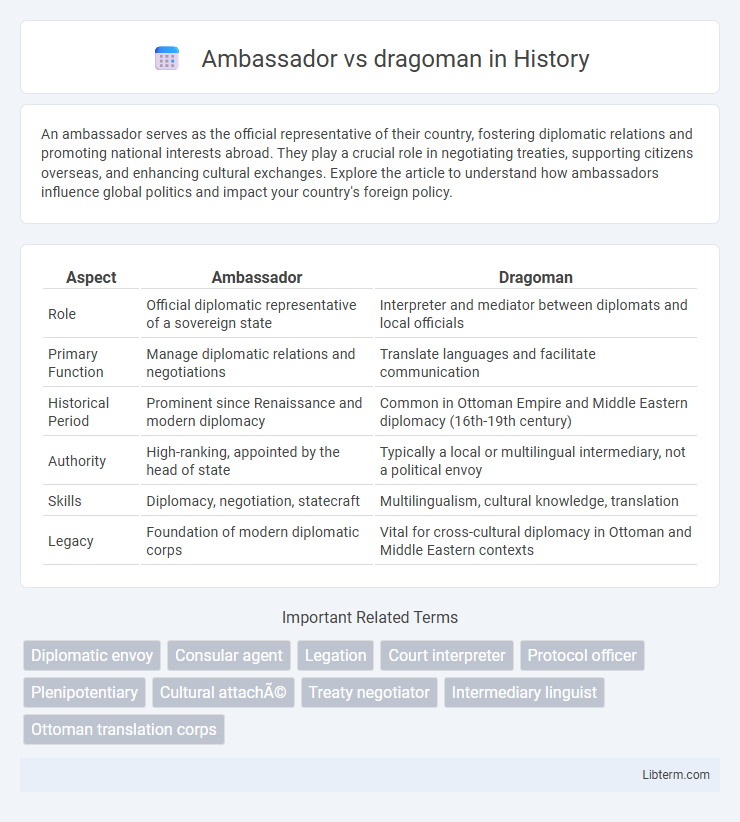An ambassador serves as the official representative of their country, fostering diplomatic relations and promoting national interests abroad. They play a crucial role in negotiating treaties, supporting citizens overseas, and enhancing cultural exchanges. Explore the article to understand how ambassadors influence global politics and impact your country's foreign policy.
Table of Comparison
| Aspect | Ambassador | Dragoman |
|---|---|---|
| Role | Official diplomatic representative of a sovereign state | Interpreter and mediator between diplomats and local officials |
| Primary Function | Manage diplomatic relations and negotiations | Translate languages and facilitate communication |
| Historical Period | Prominent since Renaissance and modern diplomacy | Common in Ottoman Empire and Middle Eastern diplomacy (16th-19th century) |
| Authority | High-ranking, appointed by the head of state | Typically a local or multilingual intermediary, not a political envoy |
| Skills | Diplomacy, negotiation, statecraft | Multilingualism, cultural knowledge, translation |
| Legacy | Foundation of modern diplomatic corps | Vital for cross-cultural diplomacy in Ottoman and Middle Eastern contexts |
Introduction to Diplomacy: Ambassador vs Dragoman
Ambassadors served as official diplomatic representatives of sovereign states, skilled in negotiation and policy execution during international relations. Dragomans acted as linguistic and cultural intermediaries, facilitating communication for ambassadors and consuls in the Ottoman Empire and surrounding regions. Both roles were essential for effective diplomacy, with ambassadors focusing on political strategies while dragomans provided crucial translation and local expertise.
Historical Origins of Ambassadors and Dragomans
Ambassadors originated in ancient Mesopotamia and classical Greece as official envoys representing sovereign rulers, establishing diplomatic relations and political negotiations. Dragomans, emerging in the Ottoman Empire during the medieval period, served as interpreters and cultural intermediaries, facilitating communication between European diplomats and Middle Eastern authorities. Both roles are integral to historical diplomacy, with ambassadors focused on political representation and dragomans specializing in linguistic and cultural translation.
Key Roles and Functions: Ambassador Defined
Ambassadors serve as official diplomatic representatives of their home country, responsible for managing political relations, negotiating treaties, and protecting their nation's interests abroad. They act as the primary liaison between governments, ensuring effective communication and fostering bilateral cooperation across economic, cultural, and security issues. Unlike dragomans, who historically functioned as linguistic and cultural intermediaries to facilitate communication, ambassadors hold formal diplomatic authority and decision-making power.
Key Roles and Functions: Dragoman Explained
Dragomans served as essential intermediaries in diplomatic missions, primarily within the Ottoman Empire, facilitating communication by translating languages and interpreting cultural nuances. Their key roles included negotiating terms, ensuring accurate transmission of messages, and advising ambassadors on local customs and protocols. Unlike ambassadors who represented sovereign states in political and diplomatic affairs, dragomans operated as linguistic and cultural experts critical for effective cross-cultural dialogue and treaty negotiations.
Skills and Qualifications Required
An ambassador requires advanced skills in diplomacy, international law, cultural sensitivity, and high-level negotiation, often accompanied by extensive experience in foreign policy and political analysis. A dragoman, historically acting as an interpreter and guide, needed fluency in multiple languages, deep knowledge of local customs, and expertise in communication between different cultures, often emphasizing linguistic proficiency over formal diplomatic training. Both roles demand strong interpersonal skills and cultural intelligence, but ambassadors typically possess formal education and strategic policy expertise that surpasses the dragoman's more practical, language-focused qualifications.
Influence on International Relations
Ambassadors serve as official diplomatic representatives, wielding significant influence on international relations through state-sanctioned negotiations and treaty formulations. Dragomans, acting as interpreters and cultural mediators in the Ottoman Empire and surrounding regions, facilitated communication and understanding between diverse entities, indirectly shaping diplomatic outcomes. While ambassadors possess formal authority impacting policy and alliances, dragomans contribute by bridging linguistic and cultural divides, essential for smoother bilateral or multilateral interactions.
Communication and Mediation Responsibilities
Ambassadors served as official diplomatic representatives who managed high-level political negotiations and maintained formal communication between sovereign states. Dragomans acted as linguistic intermediaries and cultural mediators, facilitating dialogue and translating complex messages in regions where language barriers existed. Both roles were crucial for ensuring accurate communication and effective mediation in international relations, with ambassadors handling overarching diplomatic strategies and dragomans focusing on nuanced intercultural understanding.
Evolution of Both Roles Over Time
Ambassadors evolved from royal envoys into formal diplomatic representatives with legal recognition, reflecting the rise of the modern nation-state and international law from the 17th century onward. Dragomans, originally interpreters and cultural mediators within Ottoman and Middle Eastern contexts, saw their roles diminish as Western diplomatic practices standardized and consular services expanded in the 19th and 20th centuries. The shift highlights the transition from personalized, language-based mediation to institutionalized, protocol-driven diplomacy in global affairs.
Modern-Day Relevance and Legacy
Ambassadors remain pivotal in international diplomacy, representing their nations' interests and facilitating high-level negotiations, while dragomans, historically serving as interpreters and intermediaries in the Ottoman Empire, have shaped modern diplomatic translation and cross-cultural communication practices. The legacy of dragomans endures in contemporary diplomatic language services, highlighting the importance of linguistic expertise in fostering global relations. Modern ambassadors build on this foundation, utilizing advanced communication tools to navigate complex geopolitical landscapes effectively.
Comparative Summary: Ambassador vs Dragoman
Ambassadors serve as official diplomatic representatives of their home country, responsible for managing political relations, negotiating treaties, and representing national interests abroad. Dragomans, historically functioning as interpreters and cultural mediators in the Ottoman Empire and surrounding regions, facilitated communication and negotiation between foreign diplomats and local authorities. While ambassadors hold formal political authority and diplomatic status, dragomans act as linguistic and cultural intermediaries without official diplomatic power, making their roles complementary but distinct in diplomatic contexts.
Ambassador Infographic

 libterm.com
libterm.com